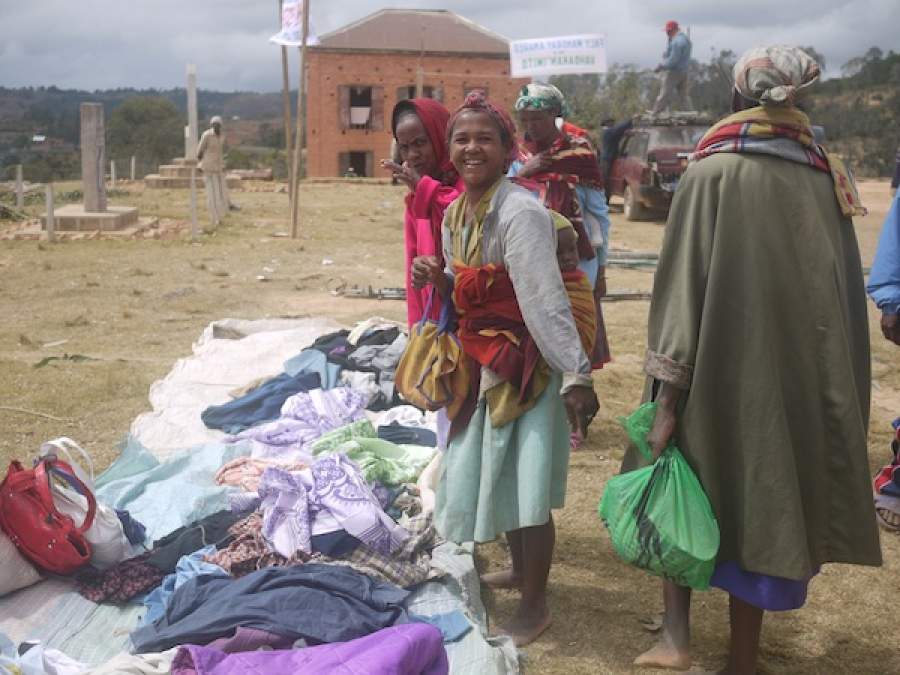In Madagascar, it’s called friperie or simply frip (deriving from the French word for a secondhand clothing shop), but used clothing markets exist all over mainland Africa.
So what is frip exactly? For the compulsive thrift shopper like myself, frip is in one word, the DREAM—cartons of indiscriminately packed secondhand surplus from places like Value Village, Goodwill or Salvation Army in the States that get shipped to developing countries like Madagascar. Piles upon piles of one country’s junk to be sifted and sorted through, washed, repaired and refashioned to become another person’s treasure.
If you’re like me, living abroad on a volunteer’s “salary” (that is to say, on savings and a minimal stipend), shopping for the latest trends in clothing is probably not a top priority—but what better pastime on a lazy Saturday afternoon than to browse the local frip in search of a good find, and one that you can afford! What better souvenir to bring home than a vintage leather Coach purse bought for less than 80 cents?
But how does one begin to delve into the overwhelming piles of stuff? Here are some tips I’ve collected from my own experiences to help guide you through the fabulousness that is frip:
1. Don’t rush!
In Malagasy, there is a proverb: Ny fotoana is vola mena, or “time is gold.” And with fripping, this proverb is especially true. Don’t make other plans, except to spend the entire afternoon browsing at your leisure. There is nothing worse than rushing through an already hectic market. Bring water and snacks, wander the street food stalls, and don’t shop on an empty stomach (from experience I’ve learned that this may lead to regrettable shopping decisions).
2. Keep an open mind.
Don’t start out your day searching for a specific item; instead, let the market speak to you. One never knows what they will find at frip, so don’t limit your options. Instead of hunting solely for pieces, like jackets or jeans, keep on the look out for one-of-a-kind patterns, prints and fabrics. Be creative! Turn that vintage shirt into a mini-dress, or that oversized skirt into an infinity scarf. Put your sewing skills to work or hire a local seamstress.
3. Learn the local language.
Acquire some helpful phrases from a local friend, such as basic numbers, and how to say please and thank you. The vendors will appreciate your motivation to learn the local language and almost always give you a better deal. (Plus, you have the added benefit of making interesting conversation and new friends.)
4. Try bartering.
In most developing countries, bartering is accepted and encouraged. Generally, try for half the asking price and work up to an amount you are comfortable with spending. Carry small bills if you can. Pick up on other nuances about the local market—for example, in Malagasy culture, the practice of asking for a kado, or a small present with a purchase, is common.
5. Quality is key. If in doubt, walk away!
No matter how cheap an item is, make sure its quality is worth the purchase. You don’t want to waste valuable luggage space home on clothes you will never wear again. Take time to find the right fit.
Hesitant to spend three bucks on those pair of sky-high leopard print heels? Take a walk around the block and decide if it’s still worth your lunch money. Ask yourself, what is the absolute most you will pay of it? Calculate the cost-per-wear for those pair of heels. (If you wear it only once, for three hours out one night, would three dollars be worth the purchase?) And if they’re still there calling your name when you return from around the block, make the splurge!
You never know what you will discover, or who you will meet on any given fripping adventure. Have fun and enjoy the finds!
Add this article to your reading list




